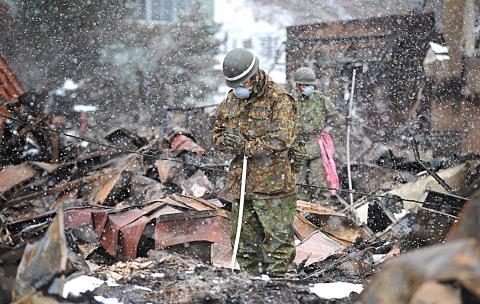|
¡@
Japan nuclear crisis sparks mass exodus
DESPERATE FOR POWER:The latest threat at a stricken power
plant was water evaporating in the fuel-rod pools, a development that could
create lethal levels of radiation
AFP, TOKYO

A Self Defense Force soldier prays before
removing the body of a tsunami victim found in the debris in Otsuchi, Iwate
Prefecture, Japan, yesterday.
Photo: AFP
Alarm over Japan¡¦s nuclear disaster grew yesterday, with more foreign
governments advising citizens to flee Tokyo as army helicopters dumped water on
the overheating plant at the center of the crisis.
Six days after a massive earthquake and tsunami plunged Japan into its worst
crisis since World War II, the US and Britain chartered flights for nationals
trying to leave and China moved thousands of citizens to Tokyo for evacuation.
Commercial airline tickets were scarce and some companies hired private jets to
evacuate staff. In Tokyo, the streets were quiet but calm as the Japanese,
though deeply concerned, mostly remained stoic over the emergency.
At the stricken Fukushima Dai-ichi nuclear power plant, 250km from Tokyo,
Chinook military helicopters dumped tonnes of water in a desperate bid to cool
reactors crippled by the earthquake to prevent a catastrophic meltdown.
Fire engines were put into action to douse fuel rods inside reactors and
containment pools submerged under water to stop them from degrading because of
exposure to the air and emitting dangerous radioactive material.
¡§Based on what experts have told us, it¡¦s important to have a certain level of
water [in the pools] before we can start to see any positive effect,¡¨ chief
government spokesman Yukio Edano told reporters.
The official toll of the dead and missing from the twin disasters, which
pulverized the northeast coast, was approaching 15,000, police said, as
aftershocks continued to rattle a jittery nation.
The number of confirmed dead stood at 5,457, with more than 80,000 buildings
damaged and 4,798 destroyed, but as Japanese and international teams mounted a
massive search and relief effort, reports from some battered coastal towns
suggested the final death toll could be far higher.
Millions of people have been left without water, electricity, fuel or enough
food and hundreds of thousands more are homeless, the misery compounded by heavy
snowfalls, freezing cold and wet conditions.
Thick snow covered wreckage littering quake-hit areas, all but extinguishing
hopes of finding anyone alive in the debris.
A cold snap brought heavy blizzards over the country¡¦s northeast overnight,
covering the tsunami-razed region in deep snow and vital highways in ice.
¡§We¡¦re already seeing families huddling around gas fires for warmth,¡¨ Save the
Children¡¦s Steve McDonald said.
¡§In these sorts of temperatures, young children are vulnerable to chest
infections and flu,¡¨ he added, estimating that the disaster had left 100,000
children homeless.
The tense nation also saw the stock market fall again yesterday, closing down
1.44 percent on fears about the economic impact.
The latest threat at the Fukushima Dai-ichi plant was the fuel-rod pools, which
contain used rods that have been withdrawn from reactors, yet remain highly
radioactive. They are immersed in cooling water for years until they shed enough
heat to become manageable for storage.
Water in one of the pools was evaporating because of the rods¡¦ heat and
temperatures were slowly rising in two other pools because coolant pumps were
knocked out by the quake and tsunami, experts said.
They warned that if the tanks run dry and leave the fuel rods exposed, the rods
could melt or catch fire, creating potentially lethal levels of radiation.
At the same time, Japanese engineers were focused on restoring the power supply
to the stricken power plant in an attempt to reactivate its cooling system.
¡§If the restoration work is completed, we will be able to activate various
electric pumps and pour water into reactors and pools for spent nuclear fuel,¡¨ a
spokesman for plant operator Tokyo Electric Power Co said.
¡@
|
![]()
![]()
![]()